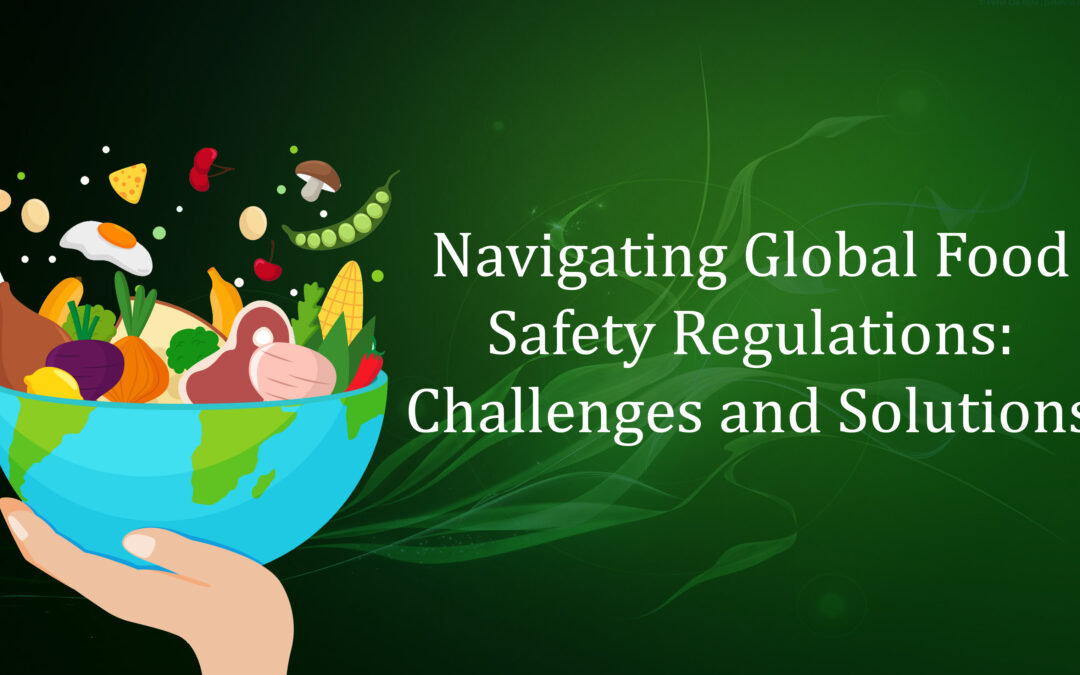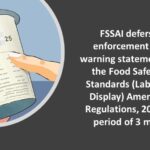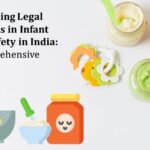Running a food business is not an easy task, specially when you are doing so from a Global level. All stakeholders have a major role to play in successful running of such food business. Imagine a food business having 50 units of food factories located in 25+ locations worldwide along with 10+ sales offices. Each locations having its own set of regulations backed by different authorities to be adhered to along with focus on business and sales. There are a lot of challenges which such company may face in business if there is a lack of compliance culture within the organization. Now imagine, from the scenario mentioned above, you receive multiple show cause notice from different regulatory authorities from different jurisdictions. What will be your next step? Definitely to resolve these issues as soon as possible. But, because of these incidents you cannot keep your business on hold, hence monitoring of all units on a day-to-day basis is a crucial step to avoid such mishaps. The next thought which may be blocking your mind is that, if we keep monitoring 50+units then when will we earn profits and focus on business. Well, now sit back and tighten your seat belts, because this blog is all about providing you with directions to some key laws of different jurisdiction, and how it can help you streamline your compliance processes.
Before diving into the challenges and solutions, let us briefly look into the food safety regulations adhered by Food Manufacturers in different jurisdictions:
India
The Food Safety and Standards Authority of India is the Authority responsible for creating legislations and imposing fines on Food manufacturers who fails to adhere to such regulations. Broadly, the Food Safety and Standards Act, 2006 regulates the manufacturing, storage, distribution, sale, and import of food products to ensure the availability of safe and nutritious food for human consumption. Regulations like Food Safety and Standards (Licensing and Registration of Food Businesses) Regulation for obtaining license before running a food business, Food Safety and Standards (Food Products Standards and Food Additives) Regulation for the purpose of regulating food manufacturers dealing with food additives, Food Safety and Standards (Packaging and Labelling) Regulation which prescribes different rules to be adhered to during packing / labelling of food items, etc. are passed under the Act, 2006 which looks after different areas involved in the food supply chain.
United States of America
The U.S. Food and Drug Administration (FDA) is the Authority responsible for protecting consumers against unsafe foods. The supply of food is regulated under the Food Modernization Act. FDA has also published the Food Code for regulating food industries, grocery stores as well as restaurants.
UAE
The Food Safety Committee under the Ministry of Climate Change & Environment works with its partners to protect consumers from unsafe food by implementing food safety regulations which requires strict controls and standards to be adhered to throughout the food chain supply. The Federal Law No. 10 of 2015 on Food Safetyprescribes standards for maintaining the safety and quality of food for ensuring the protection of consumers. Also, under the above-mentioned regulation, no food can be imported in the country for the first time without approval from the Ministry of Climate Change & Environment.
United Kingdom
The Food Standards Agency (FSA) is responsible for food safety and food hygiene in United Kingdom. The Food Safety and Standards Act, 1999 empowers FSA to penalize the food manufacturers who do not adhere to prescribed safety regulations. The General Food Law Regulation lays to provisions to recall food products which are unsafe for consumption and also inform the same to the Authority, it also requires food manufacturers to maintain records of the manufacturing process involved while making such food item.
Canada
The main food authority responsible for protecting the consumers from the consumption of unsafe food is The Canadian Food Inspection Agency. Food manufacturers dealing with frozen food needs to strictly adhere to the regulations while selling of frozen foods. It has adopted the Hazard Analysis and Critical Control Point (HACCP) System, where the food safety is addressed through the analysis and control of biological, chemical, and physical hazards from raw material production, procurement and handling, to manufacturing, distribution and consumption of the finished product.
There are different regulators in different jurisdictions, dealing with one goal, that is, to keep the food safe for human consumption. However, there are several challenges which an organization may face while dealing with different regulatory frameworks. The 3 major challenges which an organization may face while dealing with multiple regulatory frameworks are:
Maintaining Safety Standards
Maintenance of Safety Standards as per the regulations / compliance provided by different jurisdiction may be a challenging task for an organization. There may be some common standards which needs to be adhered by the organizations for maintaining the safety of food products, however, if a different set of safety requirements has been laid for a particular jurisdiction, then it becomes challenging to track every such requirements.
Varying Legislations
Dealing in a particular type of Food may cause Penalty in one jurisdiction but not in other. Different food products may be dealt in different manner across various jurisdiction. For instance: Those dealing in food or products that contain pork or alcohol or any of their by-products without permission face a prison term of not less than a month and a fine of up to AED 500,000 in UAE. However, in U.K. if you want to bring pork, such food item must not be over 2kgs and it must have a health mark.
Tracking of Regulatory Updates
As we have already observed, Food Safety and Standards Authority of India ensures food safety in India, while FDA ensures food safety in USA and so on and so forth. This implies, there are different regulators and each Authority may issue several new orders / notifications / regulations which becomes difficult to track if you are tracking such updates manually.
Streamlining the above-mentioned challenges is a crucial step for any organization dealing with multiple jurisdictions. Such challenges can be reduced, if you as a food manufacturer / legal head of a Global Food Organization has the visibility of the compliance culture prevalent within your organization. Legal-tech tool, such as Compliance Management Software can help you in overcoming such challenges. Imagine, having those 50+factories compliance report in one tool itself. It helps in having a better control of not only the various compliances completed by different organization, but also, in tracking the various incidents and on-time completion of such incidents which may have occurred in the units. However, having a stand-alone compliance management system is not enough, a mechanism whereby every new update issued by different authorities is tracked and updated into the tool in case of any change in the compliance requirement is also an important requirement for overcoming the above-mentioned challenges.
We, at Lexplosion Solutions have been working with Food Business Operators for quite some time now, aiding them in ascertaining, understanding and effectively complying with the applicable regulations as well as new amendments under the Food Safety and Standards (Labelling and Display) Regulations, 2020. Komrisk, Lexplosion’s compliance management software helps companies identify, manage, monitor, and mitigate legal risks emerging from evolving regulations and such aforesaid amendments. Komrisk has been successfully deployed and has been mitigating compliance risk globally for over a few decades now. To know more about how best we can guide and assist you in identifying, and managing monitoring your compliances, old or new, connect with us
Written by: Amanya Gangawat
Disclaimer
All material included in this blog is for informational purposes only and does not purport to be or constitute legal or other advice. This blog should not be used as a substitute for specific legal advice. Professional legal advice should be obtained before taking or refraining from an action as a result of the contents of this blog. We exclude any liability (including without limitation that for negligence or for any damages of any kind) for the content of this blog. The views and opinions expressed in this blog are those of the author/(s) alone and do not necessarily reflect the official position of Lexplosion Solutions. We make no representations, warranties or undertakings about any of the information, content or materials provided in this blog (including, without limitation, any as to quality, accuracy, completeness or reliability). All the contents of this blog, including the design, text, graphics, their selection and arrangement are the intellectual property of Lexplosion Solutions Private Limited and/or its licensors.
ALL RIGHTS RESERVED, and all moral rights are asserted and reserved.





